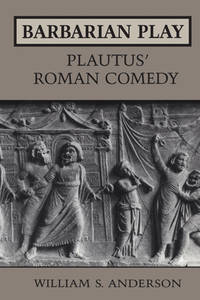
Stock Photo: Cover May Be Different
Barbarian Play: Plautus' Roman Comedy (Heritage) Paperback - 1996
by Anderson, William
- New
Description
New
NZ$57.99
FREE Shipping to USA
Standard delivery: 4 to 14 days
More Shipping Options
Ships from Phillybooks COM LLC (Pennsylvania, United States)
Details
- Title Barbarian Play: Plautus' Roman Comedy (Heritage)
- Author Anderson, William
- Binding Paperback
- Edition 1st Edition
- Condition New
- Pages 194
- Volumes 1
- Language ENG
- Publisher University of Toronto Press, Toronto
- Date 1996-10-16
- Bookseller's Inventory # 531ZZZ0164ZA_ns
- ISBN 9780802079411 / 0802079415
- Weight 0.67 lbs (0.30 kg)
- Dimensions 8.95 x 5.94 x 0.61 in (22.73 x 15.09 x 1.55 cm)
-
Themes
- Chronological Period: Ancient (To 499 A.D.)
- Cultural Region: Greece
- Dewey Decimal Code 872.01
About Phillybooks COM LLC Pennsylvania, United States
Specializing in: Books
Biblio member since 2018
The best in online world!
